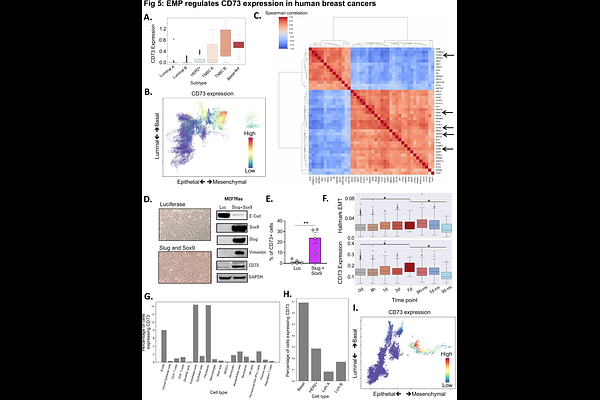CD4+ T-cells sensitize quasi-mesenchymal breast tumors lacking CD73 to anti-CTLA4 immune checkpoint blockade therapy

CD4+ T-cells sensitize quasi-mesenchymal breast tumors lacking CD73 to anti-CTLA4 immune checkpoint blockade therapy
Chandraganti, S. R.; Sams, C.; Sahoo, S.; Feng, B.; O'Connell, I.; Li, L.; Nepal, S.; Pulukuri, S.; Bakhle, K.; Thiru, P.; Simian, C.; Bell, G. W.; Jolly, M. K.; Dongre, A.
AbstractAlthough immune checkpoint blockade therapy has generated dramatic responses in certain cancer types, breast tumors are largely unresponsive. Epithelial-mesenchymal plasticity leads to the assembly of an immunosuppressive tumor microenvironment and drives resistance of breast tumors to immunotherapies. Importantly, targeting CD73 completely sensitizes quasi-mesenchymal breast tumors to anti-CTLA4 immune checkpoint blockade therapy. However, the mechanism(s) of sensitization remained unknown. We demonstrate that targeting CD73 in quasi-mesenchymal breast tumors sensitizes them to anti-CTLA4 immune checkpoint blockade therapy in a CD4+ T-cell dependent manner. Moreover, epithelial-mesenchymal plasticity results in elevated expression of cancer cell-intrinsic CD73 in human triple negative breast cancers. Given the ability of quasi-mesenchymal cancer cells to metastasize and resist multiple therapies, these findings can instruct the formation of novel translational strategies for the treatment of human breast cancers. These findings also bring to the forefront the attractive possibility of utilizing the phenotypic plasticity of cancer cells along with CD73 and CD4+ T-cells as a predictive criterion for immunotherapy responsiveness.